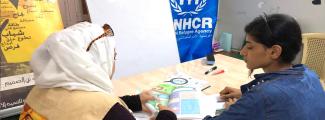Bayan is a 14-year-old displaced from Jissr Alshoughour to Lebanon. Like all displaced children, she left school without attending any other, but one of the NGOs there helped her learn how to read and write. Several years later, Bayan and her family, except her father, moved to al-Hameh in Rural Damascus. There, Bayan’s mother went to the al-Salam Community Center seeking help and the benefit from the Livelihood Programme.
Based on the family needs that Bayan’s mother registered, her daughter was referred to the Child Protection case manager. During the interview, the mother talked about her daughter, who, in addition to the problem of dropout, suffered from a significant hearing loss of up to 70%. The latter greatly affected her articulation, psychological state and made her suffer from severe nervousness resulting from the inability of others to understand what she wanted. With the mother's consent, the case manager interviewed Bayan and noticed how introverted and unresponsive she was. She also discovered that the only way to communicate with Bayan was through drawing, which she excelled at.
Consequently, a plan was developed by the case manager, in partnership with Bayan’s mother. Accordingly, Bayan was integrated within the individual reinforcement sessions, where the Education Department Supervisor assigned a volunteer to accompany and teach her for four months. In addition, Bayan was referred to two programmes: The Informal Education Programme, where she was taught how to write, and the Psychosocial Intervention through puppetry Programme. Despite all the difficulties Bayan encountered in talking and communicating with her peers in the group, she was very committed and found an alternative and very special means of communication through drawing, where she helped teach her peers how to draw and concluded the session by making a distinguished doll.
After a period of continuous work and follow-up of Bayan’s progress and responsiveness, which was punctuated by the coordination between facilitators, activity supervisors and the Child Protection case manager, and Bayan’s cooperation and persistence in overcoming all obstacles and difficulties; Bayan became an extrovert and active member in all the Child Protection activities. There, she started participating with her peers in dance activities as well as activities implemented at Dar al-Karama for Elderly and People with Specific Needs Care.
To top it all off, Bayan was referred to the International Medical Corps (IMC) and offered a hearing aid, because her hearing was our priority. Also, there was a coordination with the Deaf and Mute School so that she could register there with the help of one of the center’s volunteers. After passing the placement test, she was enrolled in 7th grade.
Bayan’s mother expressed her daughter’s progress by saying:” Bayan changed drastically. She started articulating letters she was never able to utter, and I started depending on her more-just like her other siblings- especially after she became able to distinguish the days and pronounce words from her siblings’ books.”



